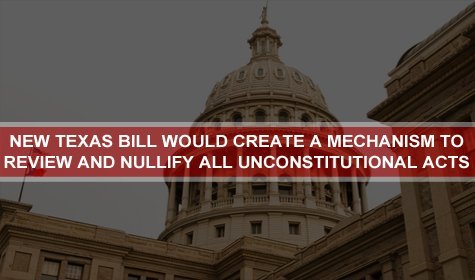AUSTIN – A Texas representative has introduced a bill that would create a joint legislative committee for the expressed purpose of nullifying unconstitutional federal laws.
House Bill 98, introduced by Rep. Dan Flynn, Van-R, would create a joint legislative committee that would consist of 14 members, including the speaker of the house, the lieutenant governor, six members of the house of representatives appointed by the speaker of the house, and six members of the senate appointed by the lieutenant governor.
Interestingly, the bill, titled the “Texas Balance of Powers Act,” specifically creates limits of the number of committee members that can belong to the same political party, with no more than four house members of the committee, including the speaker of the house, and four senate members of the committee, including the lieutenant governor. The members of the committee would serve two year terms.
If the committee determines the federal law is unconstitutional, it is considered null and void in the state unless the legislature decides to vote otherwise. The bill also contains an enforcement clause, calling on the state to actively resist any attempt to enforce a nullified federal law.
The bill begins with the following:
“The people of the several states comprising the United States of America created the federal government to be their agent for certain enumerated purposes and nothing more…..The Tenth Amendment to the United States Constitution defines the total scope of federal power as including only those powers specifically delegated by the people to the federal government. Those powers not delegated to the federal government are reserved to the states or to the people themselves.”
The bill then explains why its existence is necessary:
The federal government has acted in a manner inconsistent with the language, intent, and spirit of the United States Constitution in direct violation of the constitution and the contract between this state and its people, and the United States. This state rejects the unauthorized and excessive abuse of power by the federal government that infringes on the rights of this state and its people and that unconstitutionally undermines, diminishes, and disregards the balance of powers between the states and the federal government established by the constitution.
It also contains an explanation of the Commerce Clause, as well as the Necessary and Proper Clause, according to the context in which they were written.
As Thomas Jefferson remarked, “In questions of power, then, let no more be heard of confidence in man, but bind him down from mischief by the chains of the Constitution.”
How to do that? Jefferson made it clear in 1798, when he wrote, “Whensoever the general government assumed undelegated powers …a nullification of the act is the rightful remedy.”

